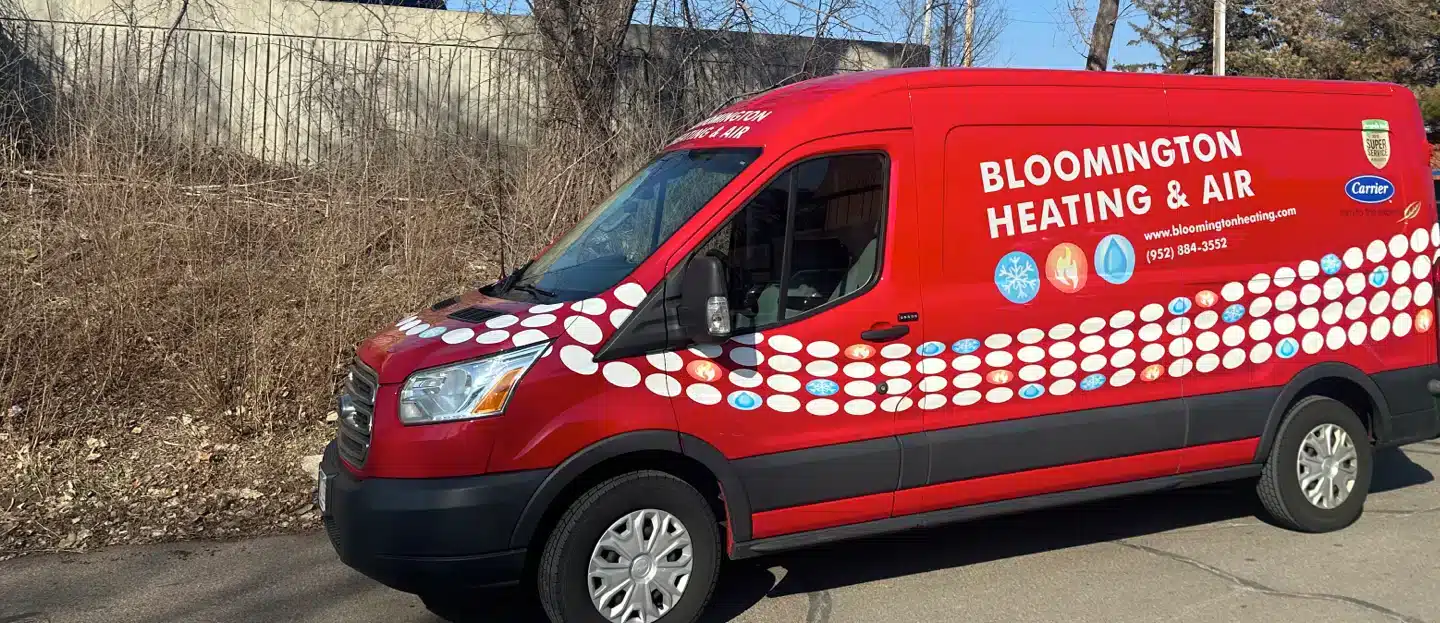
24/7 Emergency Phone Line
Family Owned & Operated
Licensed, Bonded & Insured
Stay Warm all Winter!
Bloomington Heating Services
For over 37 years, Bloomington Heating & Air has provided unmatched heating services to homeowners in Bloomington, MN, and the surrounding areas. Throughout the years, our customers remain our number one priority, and we strive to maintain the highest quality in heating system services. Our technicians undergo continual HVAC training for the most up-to-date heating system techniques and are prepared to handle any heating need – day or night.
For reliable heating installations, maintenance, and repair services, contact Bloomington Heating & Air today!
Call (952) 884-3552Our Bloomington Heating Services
We will handle any problem that comes up with your heater, no matter how old it is or what type it is. We can solve anything and can tackle any of the following:
- Emergency Heating Repairs
- Heating Repair
- Heating Installation & Replacement
- Heating Maintenance
- Furnace Repair, Installation & Maintenance
- Heat Pump Repair, Installation & Maintenance
15% off for Police and Fire Fighters
Cannot be combined with other offers. Call for details.
Our Bloomington Heating Services
Bloomington Heating Installation & Replacement
If you’re looking into replacing an old heating system, or are purchasing one for the first time, Bloomington Heating & Air can help you through the process. We offer a variety of residential heating system options from a top manufacturer for you to choose from to fit your home’s unique heating needs. Our skilled technicians can professionally install the system and ensure that every component functions properly. Having a system properly installed by a professional HVAC technician is crucial to keeping your home at the desired temperature and avoiding costly nuisances in the future.
Bloomington Heating Repairs
Heating systems become essential during the frost-filled winter months. Operating at peak efficiency, a heating system adequately warms each room of the home. But without routine maintenance, a heating system that is used day and night can develop problems, such as a worn-out fan belt or a malfunctioning ignition control, among other issues. These problems impact the system’s ability to function and can either prevent heat from sufficiently being produced or cause the system to fail completely. If your system develops heating problems, don’t wait to schedule furnace repair services! The sooner you contact us, the faster our technicians can restore heat to your home and prevent any system issue from becoming worse.
Bloomington Heating Maintenance
Planned HVAC maintenance is key to prolonging the lifespan and increasing the efficiency of your heating system. Regular system checkups will help prevent small issues from becoming larger, more costly problems that could render the entire system obsolete. Once more, HVAC maintenance will aid in reducing the need for repairs, the cost of utility bills, and provide a more comfortable indoor environment for you and your loved ones to enjoy throughout every cold season.
Emergency Heating Repairs
Going without heat in your home during the winter isn’t an option. But if you find the heat isn’t working, day or night, Bloomington Heating & Air’s technicians’ prompt response will bring the heat back soon. Keeping our customers safe and satisfied is our number one priority, and we achieve this through high-quality repairs and professional customer service. For emergency heating repairs in the middle of the night, call Bloomington Heating & Air!
Call (952) 884-3552Bloomington Heating FAQ
Bloomington Furnace Services
Furnaces are one of the most common types of heating systems, and Bloomington Heating & Air specializes in furnace repair, maintenance, and installation in Bloomington, MN. Whether you have a gas, electric, or oil furnace, our team has the expertise to ensure your system operates efficiently throughout the winter months.
Bloomington Heat Pump Services
Heat pumps, capable of providing both heating and cooling from a single unit, are an incredibly efficient and cost-effective way to manage your home’s temperature. We service all types of heat pumps and offer repair, maintenance, and installation. Our goal is to ensure your heat pump in Bloomington, MN, is in excellent working condition before we leave.
Get Help for Your Heating in Bloomington, MN Now!
If you need assistance with your heating in Bloomington, MN, contact Bloomington Heating & Air today. We are committed to arriving promptly and resolving your issue quickly so you can enjoy a warm and comfortable home as soon as possible!

